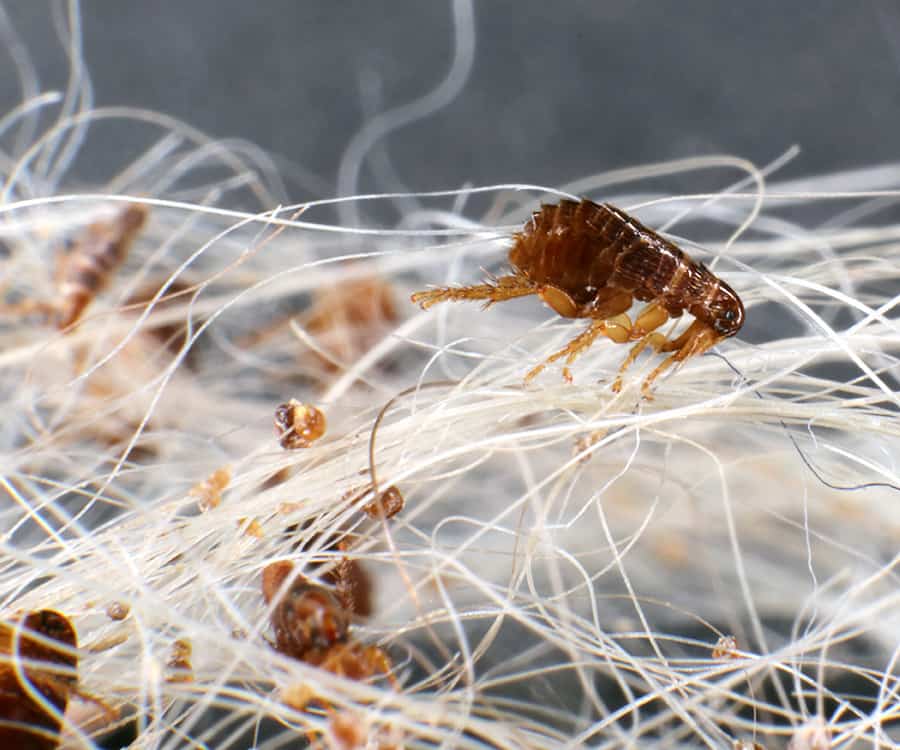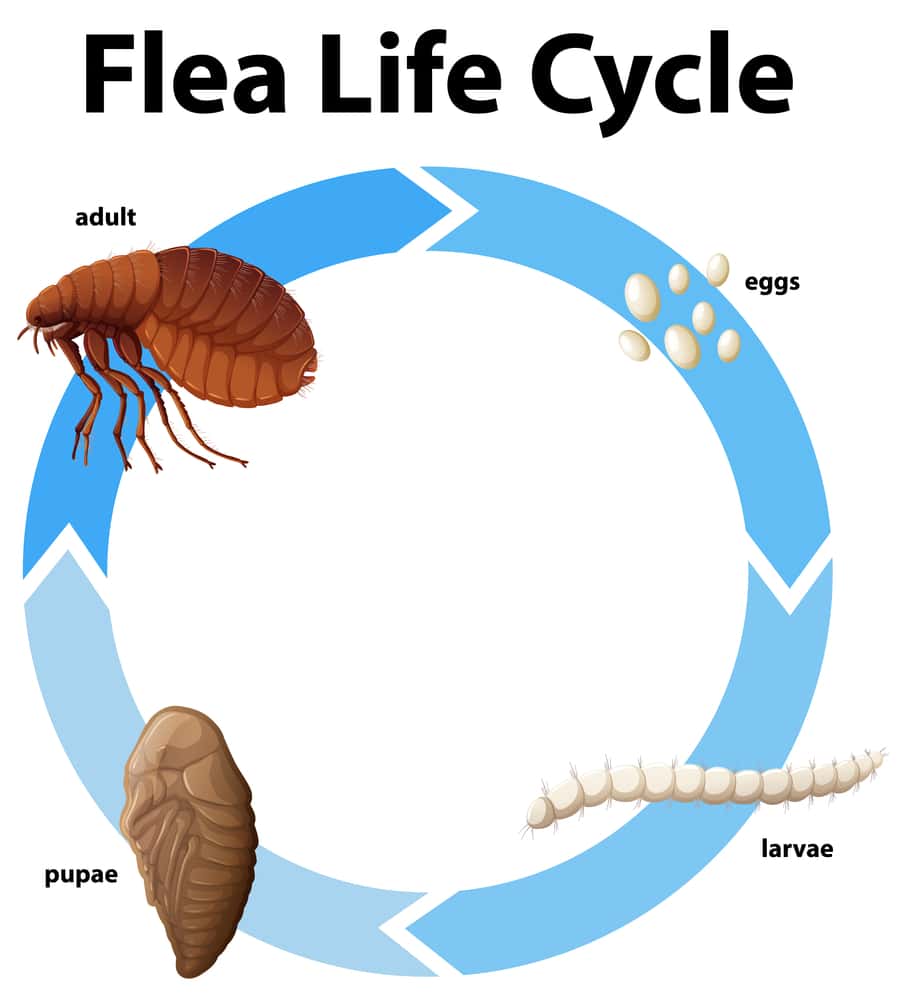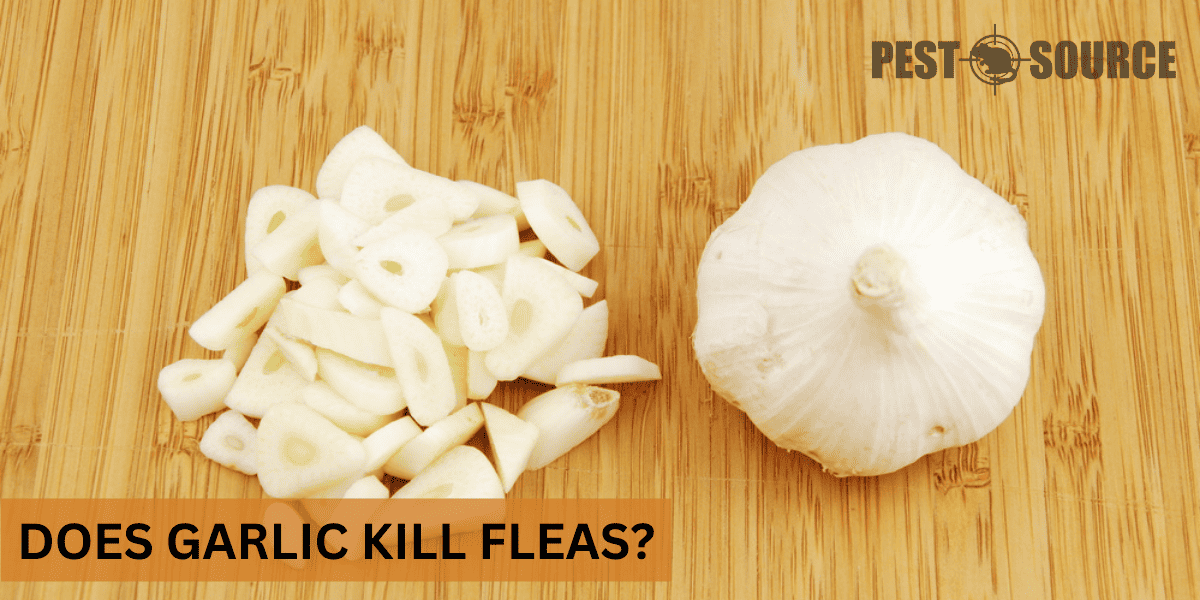Fleas are a common nuisance, especially for pet owners, and finding effective and safe ways to manage these pests is a top priority. Garlic, known for its strong smell and potential insect-repellent properties, has been a subject of interest for its potential use in flea control.
This article discusses the relationship between garlic and fleas, the effectiveness of garlic in repelling fleas, the safety considerations for using garlic on pets, and alternative solutions for flea control. Read on to learn more about the role of garlic in managing flea infestations, and whether it is worth considering as an effective natural remedy.
POINTS
- Garlic has limited effectiveness as a natural flea repellent, primarily due to the strong smell of compounds like allicin that makes the host less appealing, but it does not kill fleas directly.
- Garlic can be toxic for pets, especially dogs and cats, when consumed in large quantities or for extended periods, potentially leading to anemia and other health issues.
- There is limited evidence supporting the effectiveness of garlic in repelling other insects, such as ticks and mosquitoes, and it should not be relied upon as the sole method of protection against these pests.
- Pet owners should exercise caution when considering garlic for flea control and consult with a veterinarian before administering garlic to their pets.
- To effectively address flea infestations, it’s recommended to combine prevention, treatment, and ongoing maintenance strategies tailored to individual circumstances, rather than relying on garlic as a natural remedy.
What is the relationship between garlic and fleas?
Garlic and fleas are often connected because garlic is believed to have flea-repelling properties. People searching for natural alternatives to synthetic chemicals have turned to garlic for its potential ability to keep fleas away.
How is garlic commonly associated with flea control?

Garlic is typically associated with flea control due to the presence of certain compounds, such as allicin, an active component found in crushed garlic that has both antimicrobial and insect-repellent properties. Many people consider garlic a natural and safe alternative for controlling fleas, especially in pets, as it repels them instead of killing them directly.
What specific properties does garlic have that can affect fleas?
Garlic’s antiparasitic properties may contribute to flea control. The main component, allicin, has been shown to repel various organisms and pests, making it useful as a natural insect deterrent. It is believed that the strong smell and taste of garlic can ward off fleas by making their hosts less appealing to them.
What characteristics of fleas make them susceptible to natural repellents?

Fleas are small, blood-sucking insects that are attracted to warm-blooded animals. They have an acute sense of smell to locate their hosts. Since natural repellents, like garlic, emit strong odors, they can create an unfavorable environment for fleas and make it difficult for them to locate their preferred hosts, thereby reducing their ability to infest and reproduce.
Does Garlic Really Kill Fleas?
While garlic is commonly believed to repel fleas, the assumption that it also kills fleas is not backed by concrete evidence.
How effective is garlic at killing fleas?
Garlic is not known to be an effective method for killing fleas directly. Its primary function is to repel fleas by making their host less attractive. While garlic can discourage fleas from infesting pets or other animals, it cannot kill fleas in various life stages, such as eggs or larvae.
What is the mechanism by which garlic can influence the life cycle of fleas, particularly during their egg and larvae stages?

Garlic does not have a significant impact on the flea life cycle. Although it might discourage adult fleas from feeding on certain hosts, it does not inhibit or destroy flea eggs or larvae. Therefore, garlic cannot be considered an effective method for controlling flea infestations during the egg and larval stages.
What makes fleas hate garlic?
Fleas dislike garlic because of its strong smell. Many pests, including fleas, are repelled by strong-smelling compounds, such as allicin found in garlic, as it can create an unfavorable environment for them. This may lead fleas to avoid hosts that have a garlic odor on their skin or have consumed garlic.
How is garlic used to get rid of fleas?
Some pet owners use garlic by:
- Adding small amounts of crushed garlic to their pet’s food, hoping that the garlic’s smell and taste would deter fleas. However, this method holds potential risks for pet health, as consuming too much garlic can be toxic for dogs and cats.
- Garlic-based supplements
- Flea-repellent sprays containing garlic.
It is crucial for pet owners to exercise caution and consult with a veterinarian before using garlic for flea control.
Garlic as a Flea Repellent

How does garlic repel fleas?
Garlic repels fleas primarily because of its strong odor. When garlic is broken down, it releases a compound called allicin, which has an unpleasant smell to fleas. The smell creates an unfavorable environment for fleas and makes it difficult for them to locate their preferred hosts, hence reducing their chance of infesting and reproducing.
What properties of garlic make it repulsive to fleas?
Garlic’s association with flea control is primarily based on its natural compounds, believed to offer repellent properties against pests. The following table highlights key compounds found in garlic and their characteristics, shedding light on how garlic is commonly linked to repelling fleas.
| Compound | Properties | Effect on Fleas |
|---|---|---|
| Allicin | Produced when garlic is crushed; has antimicrobial and insect-repellent properties. | Repels fleas by making the host less appealing due to its strong odor. |
| Diallyl disulfide | Another sulfur-containing compound contributing to garlic’s distinctive smell. | May contribute to the repellent effect, though specific impact on fleas is less documented. |
| Diallyl trisulfide | Similar to diallyl disulfide, contributes to the potent aroma of garlic. | Like other sulfur compounds, potentially aids in repelling fleas, though evidence is anecdotal. |
How does the scent and taste of garlic in the bloodstream deter fleas?
When consumed in small amounts, garlic’s scent and taste can be present in an animal’s bloodstream, serving as a natural repellant against fleas. The strong scent and taste make the host less appealing to fleas, reducing the likelihood of infestation. However, it is essential for pet owners to remember that consuming too much garlic can be harmful to dogs and cats.
Is Garlic an Effective Flea Control Method for Dogs?

Can garlic repel fleas on dogs?
Garlic might have some flea-repellent properties for dogs, but its efficacy is limited. While adding small amounts of crushed garlic to a dog’s food might make their blood less appealing to fleas, this is not a guaranteed solution, and the risks associated with using garlic for flea control outweigh the potential benefits.
How safe and effective is garlic for dogs’ flea control?
Garlic is not entirely safe for dogs, as it can be toxic when consumed in large quantities or for extended periods. Excessive garlic intake can lead to hemolytic anemia, a condition characterized by the breakdown of red blood cells. Given the potential health risks, it is preferable to consider safer alternatives for flea control in dogs, such as prescription flea treatments or natural repellents that pose no harm to pets.
Are there specific garlic products, like garlic pills, beneficial for dogs to control fleas?

Garlic pills and other garlic-based products are available in the market, claiming to be suitable for dogs to control fleas. However, their safety and effectiveness have not been thoroughly evaluated. It is crucial to consult with a veterinarian before using any garlic-based products for flea control in dogs.
Can Garlic be Used to Repel Fleas on Cats?

How effective is garlic at repelling fleas on cats?
Garlic is not considered an effective flea repellent for cats. Cats have a higher sensitivity to garlic and are at a greater risk of toxicity than dogs. Furthermore, there is little evidence to support the idea that consuming garlic can successfully deter fleas on cats.
What are the safety considerations when using garlic for cat flea control?
Garlic is not safe for cats and should be avoided as a flea control method. Cats are more sensitive to the toxic effects of garlic than dogs, and even small amounts can cause anemia, gastroenteritis, and other health issues. It is essential to consult with a veterinarian to explore safer alternatives for flea control in cats.
What are the Other Insects that Dislike Garlic?
Garlic is not only discussed in the context of flea control but is also believed to repel other types of insects, thanks to its strong smell. The table below explores garlic’s potential effectiveness against ticks and mosquitoes, providing insight into its broader use in pest control.
| Pest | Effectiveness of Garlic | Evidence Level |
|---|---|---|
| Ticks | Potentially deterrent due to odor, but not well-documented | Largely anecdotal; lacks strong scientific support |
| Mosquitoes | Some deterrent effect suggested, but insufficient as a standalone repellent | Limited; not adequate compared to DEET or other proven repellents |
Apart from fleas, does garlic repel ticks?

Garlic is believed to deter ticks to some extent, similar to how it repels fleas, due to its strong smell. However, the effectiveness of garlic as a tick repellent is not well-documented and remains largely anecdotal. It is advisable to rely on proven tick prevention methods and consult with a veterinarian before using garlic as a tick repellent for pets.
Is garlic an effective mosquito repellent?

The effectiveness of garlic as a mosquito repellent remains inconclusive. Some studies suggest that garlic can provide limited protection against mosquitoes but isn’t sufficient to replace commercial mosquito repellents. Eating garlic or using garlic-based products might offer some level of mosquito deterrence, but the protection provided is not adequate when compared to approved repellents containing DEET or other active ingredients.
Does eating garlic or taking garlic capsules help in repelling mosquitoes?

There is limited evidence to support the idea that eating garlic or taking garlic capsules can help in repelling mosquitoes. While some anecdotal evidence exists, scientific studies have not established a clear correlation between garlic consumption and mosquito repellency. Consequently, garlic should not be considered a reliable form of mosquito protection.
What are the Limitations and Safety Concerns of Using Garlic for Flea Control?
Are there any risks or downsides to using garlic as a method of flea control?
Using garlic for flea control comes with notable limitations and safety concerns, particularly when considering the health of pets. The table below outlines these risks and downsides, emphasizing the importance of cautious use and the potential consequences of relying on garlic as a flea repellent.
| Limitation | Description | Safety Concerns |
|---|---|---|
| Ineffectiveness in killing fleas | Garlic does not kill fleas or their eggs/larvae, offering limited repellency. | Reliance may lead to untreated infestations. |
| Toxicity to pets | Consuming large amounts of garlic can be toxic, especially to dogs and cats. | Potential for anemia and other health issues. |
| Limited evidence on repellency | Scientific support for garlic’s effectiveness as a flea repellent is scant. | Misplaced trust in garlic’s efficacy. |
| Risk of alternative insect attraction | The smell of garlic might repel fleas but could attract other unwanted insects. | Unintended consequences in pest control. |
Is garlic harmful to pets if ingested in certain quantities?
Yes, garlic can be harmful to pets, particularly cats and dogs, if consumed in large quantities or for extended periods. Pet owners should exercise caution when using garlic as a flea control method and consult with a veterinarian before deciding to administer garlic to their pets.
What is the role of garlic pills in flea control for humans?
Garlic pills have been marketed as a natural flea control method, but their efficacy in repelling fleas remains unproven. While garlic pills might provide some level of deterrence due to the presence of the strong-smelling compounds, they should not be relied upon as the sole method of flea control.
What are common misconceptions about using garlic for flea control?
Some common misconceptions about using garlic for flea control include:
- Garlic kills fleas: Garlic has limited repellent properties and does not kill fleas directly.
- Garlic is a safe flea control method for pets: Excessive consumption of garlic can be toxic for pets, particularly dogs and cats, leading to health issues.
Conclusion: Is Garlic an Effective Natural Remedy for Flea Control?
Garlic has limited effectiveness as a natural flea repellent. While it may offer some degree of flea deterrence, it is neither a comprehensive nor reliable solution for flea control. Moreover, using garlic for pets carries potential risks to their health.
In light of these limitations, pet owners and individuals seeking natural alternatives for flea control should consult with experts to evaluate other natural remedies or approved flea control products that are proven to be safe and effective. The best course of action in addressing flea infestations is to combine prevention, treatment, and ongoing maintenance strategies tailored to individual circumstances.



